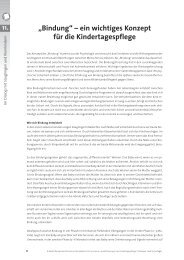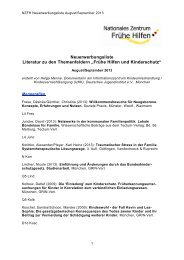download - Deutsches Jugendinstitut e.V.
download - Deutsches Jugendinstitut e.V.
download - Deutsches Jugendinstitut e.V.
You also want an ePaper? Increase the reach of your titles
YUMPU automatically turns print PDFs into web optimized ePapers that Google loves.
Evaluator’s Perspective<br />
In conclusion, the following points should be mentioned from the perspective of the<br />
national evaluation of the Children’s Fund activities in Great Britain which necessitate a<br />
critical evaluation of the outcome of the Children’s Fund programme:<br />
Aspects of data basis:<br />
− The confidence in existing administrative and local data is not always justified.<br />
This is understandable as decisions regarding national financial contributions<br />
are made on the basis of local information.<br />
− It is imperative to combine a wide range of data resources; these resources are<br />
influenced through the preferences and priorities of the users, providers and<br />
local policy-makers.<br />
− The involvement of the providers enables the selection of specific risk groups<br />
and the comprehension of particular interests<br />
− The available compendium of data concerning current financial contributions<br />
highlights the differences and deficits of these contributions and therefore<br />
provides a basis for new financial budgeting.<br />
Aspects of “Commissioning” (awarding of contracts/bidding process):<br />
The process of awarding contracts through bidding invitations deviates from traditional<br />
methods concerning the local organisation of social services.<br />
This can be described as a process “from targeting to commissioning”: here there is<br />
direct access to the service providers and the suppliers of social services which are<br />
considered necessary.<br />
Generally, local authorities have undertaken a wide variety of different approaches.<br />
In certain districts, institutions and suppliers of services were directly contacted and<br />
commissioned within the framework of the LSP without any form of competitive process,<br />
whereas others utilised a competitive process for the allocation of services. To a certain<br />
extent, these processes were initially utilised in order to develop the strategies themselves.<br />
This wide variety displays the flexibility of local decision-makers acting within the<br />
framework of the Children’s Fund’s transversal strategy. On the other hand, processes<br />
could be observed which were contrary to the aims of the Children’s Fund.<br />
Basically, commissioning is about who can offer the best concepts (in some cases in<br />
competition with other service providers) for the solution of problems and not who is the<br />
most qualified to solve the problem. For example, responsibilities can be transferred to<br />
thematically oriented “commissioning groups”. This is expected to result in the<br />
development of clear and strict criteria which will also facilitate the evaluation of the results<br />
and thereby provide a better basis for further strategic concepts.<br />
Strategic action on a local level<br />
It became clear that the strategic requirements and approaches targeted by the Children’s<br />
Fund in the combating of problems encountered by children and young people were not<br />
always followed through to their conclusion. This became obvious in the case of specific<br />
target groups. In the wide-spread existing problems concerning so-called “travellers” it was<br />
observed that it was not possible to involve all local authorities in the processes; it was<br />
64

















